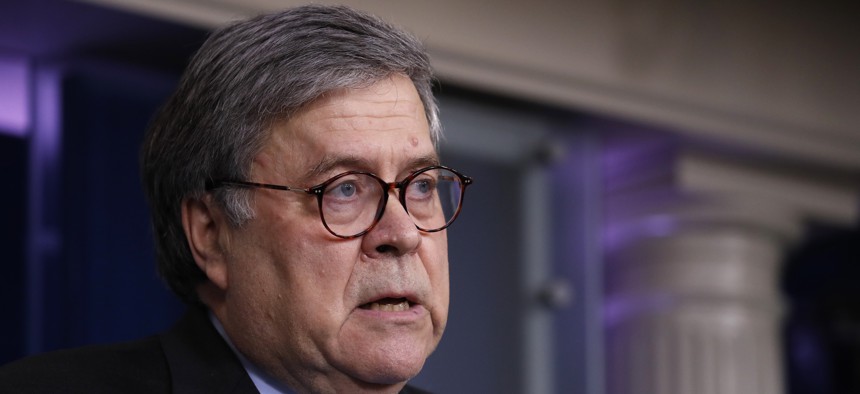DOJ Could Intervene If States Too Restrictive Going Forward, Barr Says

Attorney General William Barr speaks about the coronavirus in the James Brady Press Briefing Room of the White House on April 1, 2020, in Washington. AP Photo/Alex Brandon

Connecting state and local government leaders
“We have to do a better job of making sure that the measures that are being adopted are properly targeted,” said U.S. Attorney General William Barr.
The Trump administration could end up in court challenging state restrictions to curb coronavirus spread it deems too onerous and possibly unconstitutional, U.S. Attorney General William Barr said in a radio interview Tuesday.
Barr acknowledged the “very broad police powers” of governors during an interview with Hugh Hewitt. He also recognized the difficulties of trying to contain the highly contagious respiratory illness, which over the past month has forced most governors to issue stay-at-home orders. But he echoed assertions from President Trump that restrictions soon will need to be eased to reinvigorate the economy. “We have to do a better job of making sure that the measures that are being adopted are properly targeted,” Barr said.
“We do have a national economy, which is the responsibility of the federal government,” Barr said. “So it is possible that governors will take measures that impair interstate commerce. And just where that line is drawn, you know, remains to be seen.”
Barr suggested that the Justice Department wouldn’t initiate legal action against states, but first urge governors to loosen mandates the administration considers too restrictive. But if lawsuits are filed by state residents, Barr said he could see his agency at times deciding to file “statements of interest” that side with plaintiffs.
“At this stage—and we’re at sort of a sensitive stage where we’re really transitioning to starting a process of trying to get the nation back up and running—you know, I think that’s the best approach. As lawsuits develop, as specific cases emerge in the states, we’ll take a look at them,” Barr said.
Trump has at times asserted his primacy over governors when it comes to coronavirus restrictions. But legal scholars have noted the U.S. Constitution actually gives state and local leaders a great deal of power. In a post on Lawfare, University of Texas law professor Bobby Chesney argued that “the federal government cannot coerce the states into taking actions to suit federal policy preference.”
The White House last week released a three-stage plan to guide governors as they look at rolling back social distancing and other restrictions. It suggested the first condition would be a decline in positive Covid-19 tests for two weeks. This week, governors in Georgia, Tennessee and South Carolina announced they would start allowing businesses to reopen, with some starting as soon as Monday. None of those states have seen the sustained reduction in cases laid out by the White House.
Across the country, hundreds of people have protested the stay-at-home orders at state capitols, demanding that restrictions be eased. But polling shows the limits are very popular, with a Quinnipiac University poll finding that 81% of respondents said they would be in favor of a national stay-at-home order.
Barr noted this issue is complicated, but said that making people stay in their homes is “disturbingly close to house arrest.”
“I’m not saying it wasn’t justified. I’m not saying in some places it might still be justified. But it’s very onerous, as is shutting down your livelihood,” he said.
OTHER STORIES on Route Fifty:
-
Senate Passes Interim Coronavirus Aid Package to Fund Testing, Extend Small Business Aid
-
Sectors and States Poised to See Worst Job Losses Highlighted in New Research
-
State Leaders Move to Protect Stimulus Checks from Debt Collectors
-
As New York Begins ‘Aggressive’ Antibody Testing, Experts Caution Much Still Unknown About Immunity
-
‘There’s Never Been Anything Like This:’ Managing the State Employee Workforce
- States Start Hiring Battalions of Contact Tracers to Track Covid-19
Laura Maggi is the Managing Editor of Route Fifty.

NEXT STORY: Who Has the Right to Shelter in a Small Town?





